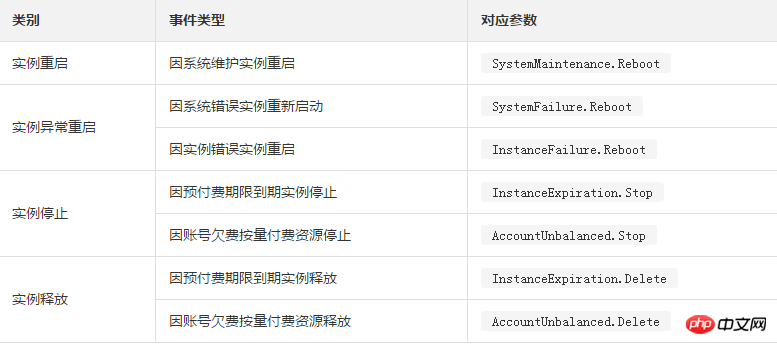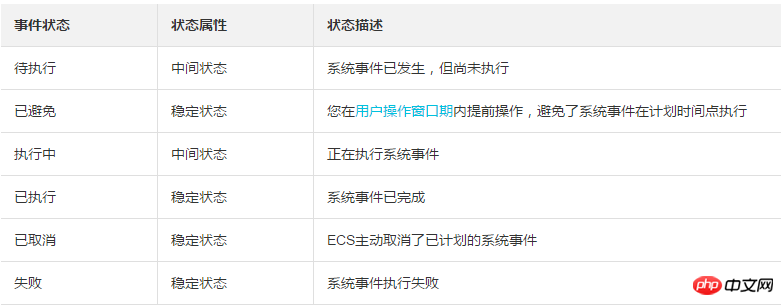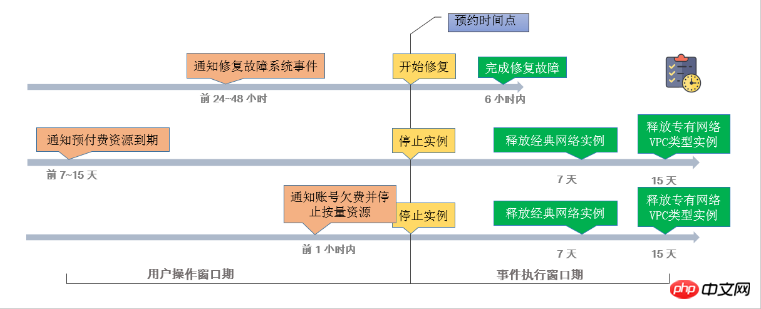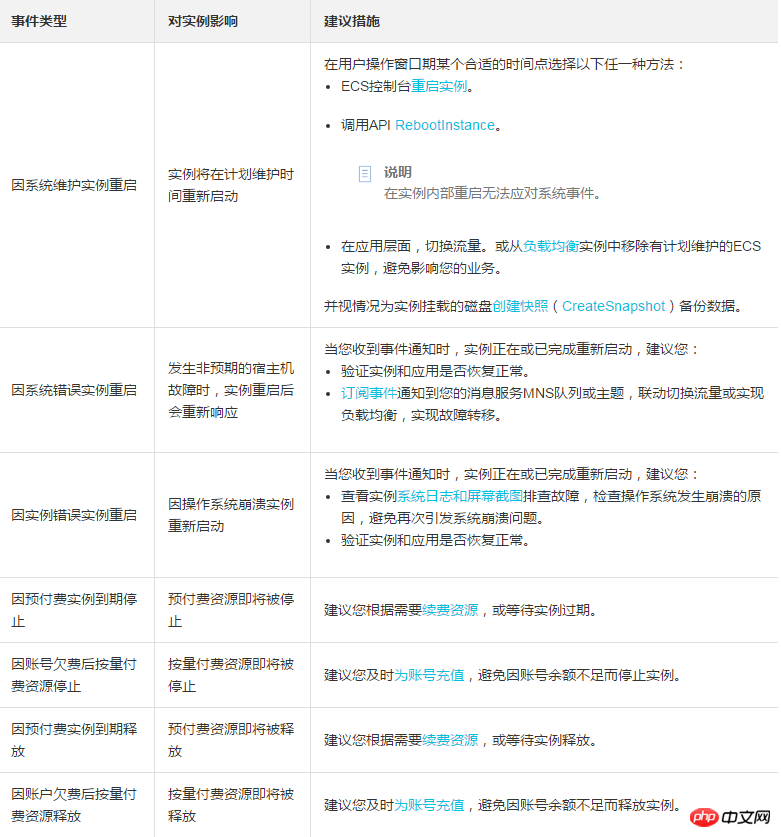 Operation and Maintenance
Operation and Maintenance
 Linux Operation and Maintenance
Linux Operation and Maintenance
 How to handle planned or unanticipated events that affect the running status of your instance
How to handle planned or unanticipated events that affect the running status of your instance
How to handle planned or unanticipated events that affect the running status of your instance
This article introduces how to deal with planned or unexpected events that affect the running status of the instance, and focuses on the specific steps. The content of this article is very compact, and I hope you will study patiently.
System events
System events are planned or unanticipated events that affect the running status of the instance. Specifically refers to events such as restarting, stopping, or releasing ECS instances due to detection of update maintenance, illegal operations, system failures, software and hardware failures, due to prepayment expiring or accounts in arrears.
Overview
Instances are the core basic components for building business applications. When you complete instance selection, purchase, initial configuration and start After the business is deployed, the health status of the instance plays a key role in your business continuity and system reliability. In order to improve system reliability, system performance and security protection capabilities, ECS will proactively perform routine maintenance on the physical server where the instance is hosted and repair potential system failures. When a physical server failure or hidden danger is detected, ECS will live-migrate the instance to a healthy server online to maintain the healthy running status of the instance. These maintenance are routine maintenance. Routine maintenance is different from system events. Routine maintenance is usually completed without any awareness. Maintenance notifications will not be sent and the instance will not be affected.
When a system event occurs, ECS will promptly send you notifications, response measures, event cycles and other information. For planned system events, information such as the impact of the event on the instance and the expected execution time will be informed in advance. You can back up data in time before executing system events, make application-level preparations, and prevent potential impacts on business reliability and continuity. For processed system events, you can query the historical system events of the instance in the past two months to obtain fault diagnosis and review analysis data.
Usage restrictions
Except for instance type families that have been discontinued, such as c1, c2, m1, m2, s1, s2, All instance type families, such as s3 and t1, support the system event function. For more details, see Instance Type Family.
Event types
System event types are shown in the following table.

Event status
In the life cycle of system events, there are the following event statuses.

Event window
System events have the following window period:
User operations Window period: The time period between the initiation of the system event plan and its execution. Usually the user operation window period for system maintenance-related events is 24 to 48 hours. The operation window period for stopping prepaid instances due to expiration is 7 to 15 days. The operation window period for stopping due to account arrears is usually less than 1 hour.
You can choose the recommended response method to repair the system event in advance based on the impact of the event on the business, or wait for the default response action to be performed. For system events triggered by ECS proactively repairing system failures, ECS will send you event notifications in advance according to the system maintenance operation plan.
Event execution window period: If you do not respond to system events in advance, repairing faulty system events will usually be completed automatically within 6 hours of entering the event execution window period. System event instances caused by billing issues will be immediately After stopping, classic network type instances will be released after 7 days and VPC type instances will be released after 15 days. You will then receive the execution results of the system event.

Note
For unexpected system events caused by non-technical factors such as sudden failures or illegal operations, there is usually no user operation window period. A short event execution window. You can query historical system events for fault diagnosis, cause analysis, or data recovery.
View system events
If there are planned system events, a prominent mark will appear on the pending event button on the ECS console to remind you to check .
Log in to the ECS management console.
In the left navigation bar, click Overview.
In the common operations area of the overview page, click the pending event.
Click the system scheduled event page, and you can see related information such as instance ID, region, instance running status, event type, recommended actions, etc. You can perform the required operations in the operation column.
API operation: DescribeInstancesFullStatus queries the system events of the instance.
View historical system events
On the All Events page, you can view all system event records that occurred in the past two months, which are faults Diagnosis and review analysis provide data support.
Log in to the ECS management console.
In the left navigation bar, click Overview.
In the common operations area of the overview page, click the pending event.
In the left navigation bar, click All Events. On the All Events page, click System Scheduled Events > Instances to view related information such as instance ID, event type, and event status.
API operation: DescribeInstanceHistoryEvents queries historical system events.
Subscribe to event notifications
All system events can be configured with alarm rules through cloud monitoring, and you will be notified in time when an event occurs. For more details, see the Cloud Monitoring document Cloud Product System Event Monitoring.
Response Suggestions
You can respond to system events through console operations or API calls. Managing ECS based on system events can improve your underlying awareness of ECS and optimize ECS instance operation and maintenance.

The above is the detailed content of How to handle planned or unanticipated events that affect the running status of your instance. For more information, please follow other related articles on the PHP Chinese website!

Hot AI Tools

Undresser.AI Undress
AI-powered app for creating realistic nude photos

AI Clothes Remover
Online AI tool for removing clothes from photos.

Undress AI Tool
Undress images for free

Clothoff.io
AI clothes remover

AI Hentai Generator
Generate AI Hentai for free.

Hot Article

Hot Tools

Notepad++7.3.1
Easy-to-use and free code editor

SublimeText3 Chinese version
Chinese version, very easy to use

Zend Studio 13.0.1
Powerful PHP integrated development environment

Dreamweaver CS6
Visual web development tools

SublimeText3 Mac version
God-level code editing software (SublimeText3)

Hot Topics
 deepseek web version entrance deepseek official website entrance
Feb 19, 2025 pm 04:54 PM
deepseek web version entrance deepseek official website entrance
Feb 19, 2025 pm 04:54 PM
DeepSeek is a powerful intelligent search and analysis tool that provides two access methods: web version and official website. The web version is convenient and efficient, and can be used without installation; the official website provides comprehensive product information, download resources and support services. Whether individuals or corporate users, they can easily obtain and analyze massive data through DeepSeek to improve work efficiency, assist decision-making and promote innovation.
 How to install deepseek
Feb 19, 2025 pm 05:48 PM
How to install deepseek
Feb 19, 2025 pm 05:48 PM
There are many ways to install DeepSeek, including: compile from source (for experienced developers) using precompiled packages (for Windows users) using Docker containers (for most convenient, no need to worry about compatibility) No matter which method you choose, Please read the official documents carefully and prepare them fully to avoid unnecessary trouble.
 Ouyi okx installation package is directly included
Feb 21, 2025 pm 08:00 PM
Ouyi okx installation package is directly included
Feb 21, 2025 pm 08:00 PM
Ouyi OKX, the world's leading digital asset exchange, has now launched an official installation package to provide a safe and convenient trading experience. The OKX installation package of Ouyi does not need to be accessed through a browser. It can directly install independent applications on the device, creating a stable and efficient trading platform for users. The installation process is simple and easy to understand. Users only need to download the latest version of the installation package and follow the prompts to complete the installation step by step.
 BITGet official website installation (2025 beginner's guide)
Feb 21, 2025 pm 08:42 PM
BITGet official website installation (2025 beginner's guide)
Feb 21, 2025 pm 08:42 PM
BITGet is a cryptocurrency exchange that provides a variety of trading services including spot trading, contract trading and derivatives. Founded in 2018, the exchange is headquartered in Singapore and is committed to providing users with a safe and reliable trading platform. BITGet offers a variety of trading pairs, including BTC/USDT, ETH/USDT and XRP/USDT. Additionally, the exchange has a reputation for security and liquidity and offers a variety of features such as premium order types, leveraged trading and 24/7 customer support.
 Get the gate.io installation package for free
Feb 21, 2025 pm 08:21 PM
Get the gate.io installation package for free
Feb 21, 2025 pm 08:21 PM
Gate.io is a popular cryptocurrency exchange that users can use by downloading its installation package and installing it on their devices. The steps to obtain the installation package are as follows: Visit the official website of Gate.io, click "Download", select the corresponding operating system (Windows, Mac or Linux), and download the installation package to your computer. It is recommended to temporarily disable antivirus software or firewall during installation to ensure smooth installation. After completion, the user needs to create a Gate.io account to start using it.
 Ouyi Exchange Download Official Portal
Feb 21, 2025 pm 07:51 PM
Ouyi Exchange Download Official Portal
Feb 21, 2025 pm 07:51 PM
Ouyi, also known as OKX, is a world-leading cryptocurrency trading platform. The article provides a download portal for Ouyi's official installation package, which facilitates users to install Ouyi client on different devices. This installation package supports Windows, Mac, Android and iOS systems. Users can choose the corresponding version to download according to their device type. After the installation is completed, users can register or log in to the Ouyi account, start trading cryptocurrencies and enjoy other services provided by the platform.
 How to automatically set permissions of unixsocket after system restart?
Mar 31, 2025 pm 11:54 PM
How to automatically set permissions of unixsocket after system restart?
Mar 31, 2025 pm 11:54 PM
How to automatically set the permissions of unixsocket after the system restarts. Every time the system restarts, we need to execute the following command to modify the permissions of unixsocket: sudo...
 Why does an error occur when installing an extension using PECL in a Docker environment? How to solve it?
Apr 01, 2025 pm 03:06 PM
Why does an error occur when installing an extension using PECL in a Docker environment? How to solve it?
Apr 01, 2025 pm 03:06 PM
Causes and solutions for errors when using PECL to install extensions in Docker environment When using Docker environment, we often encounter some headaches...





